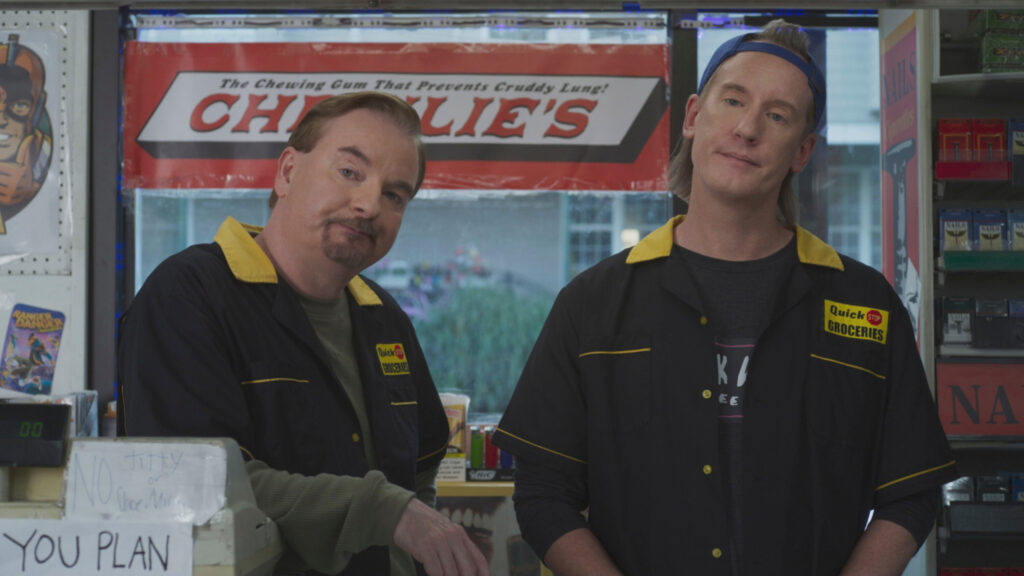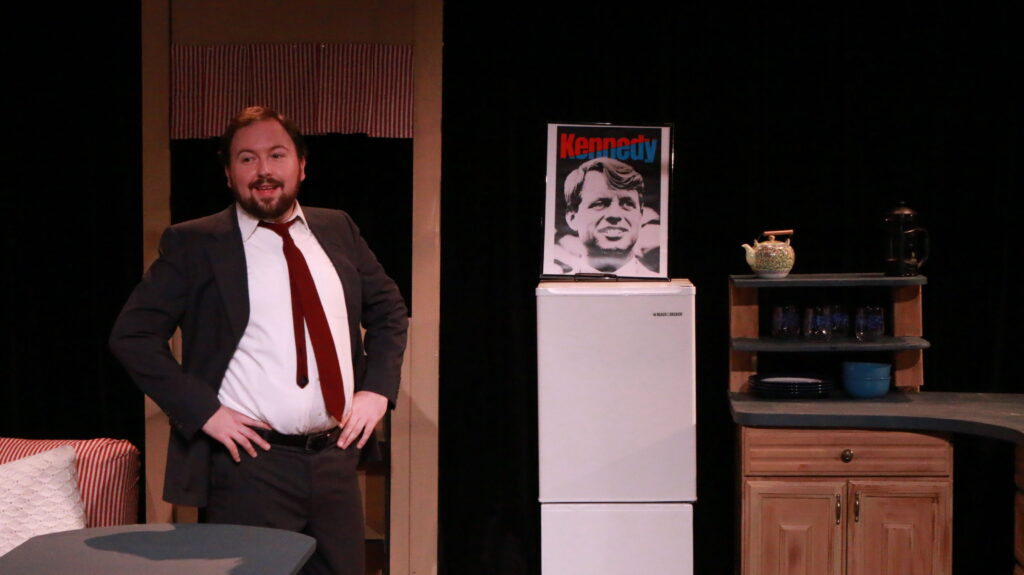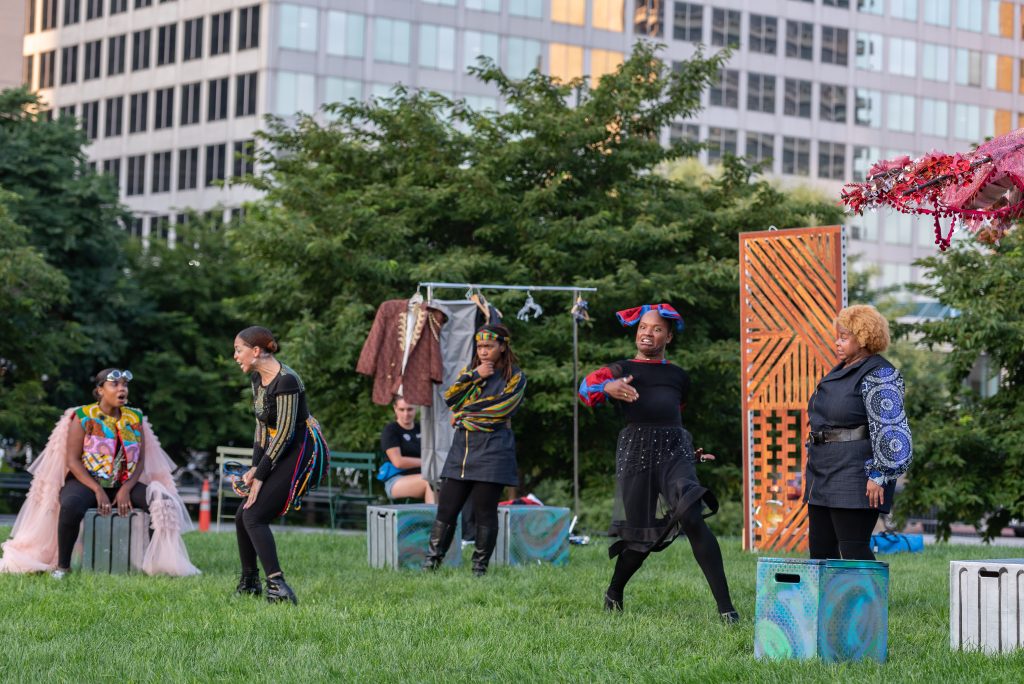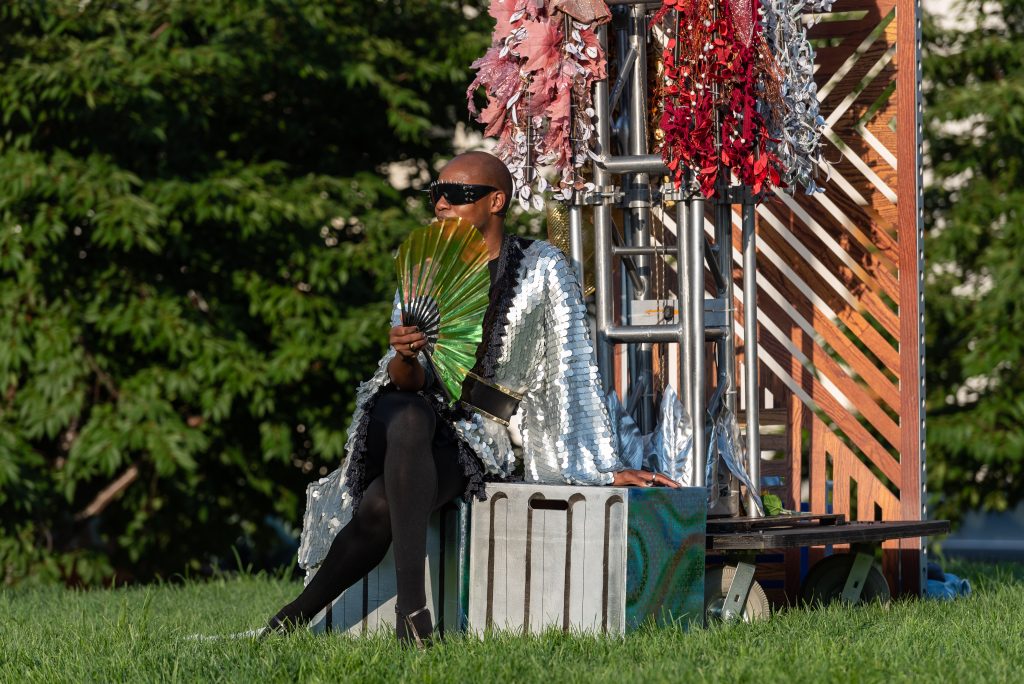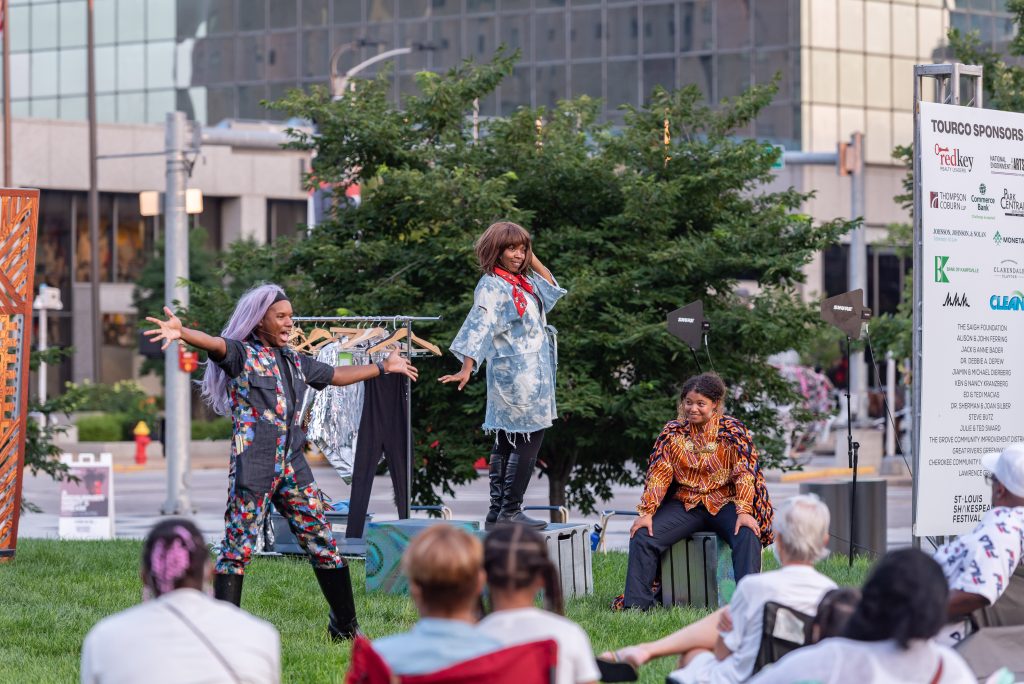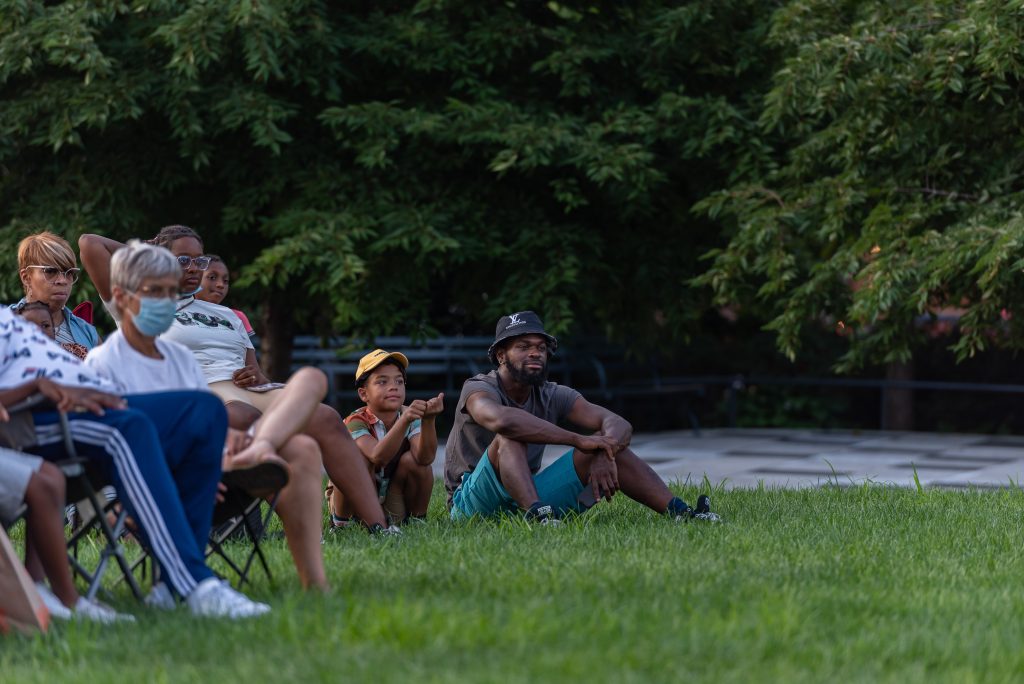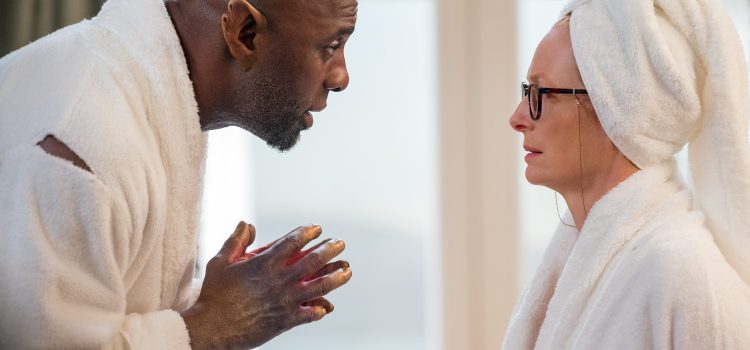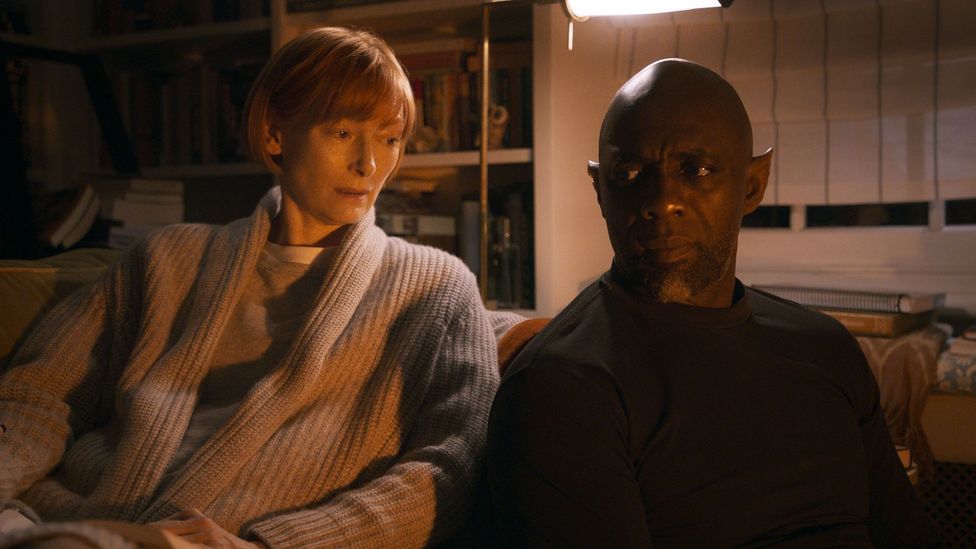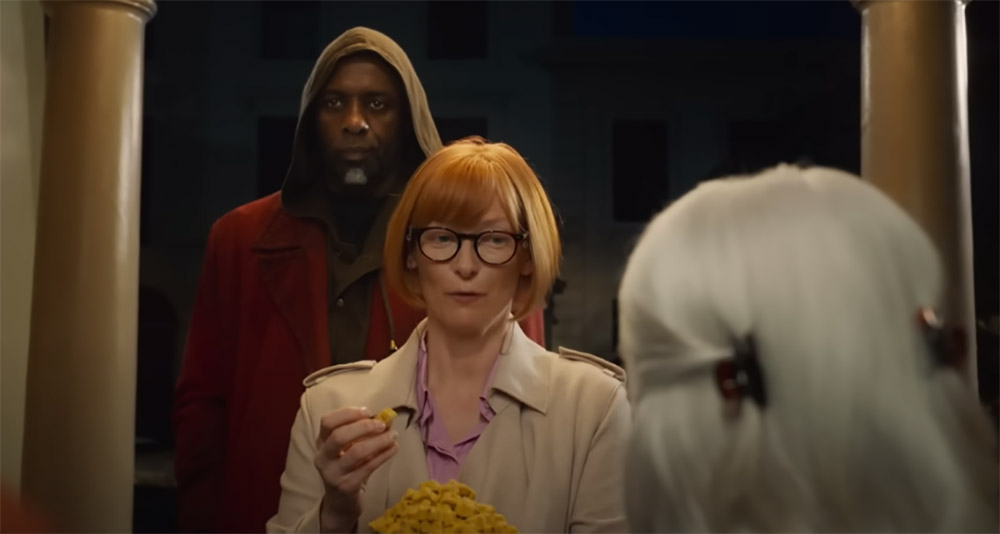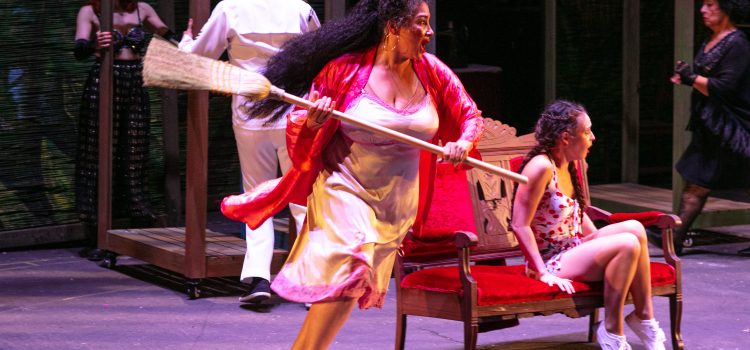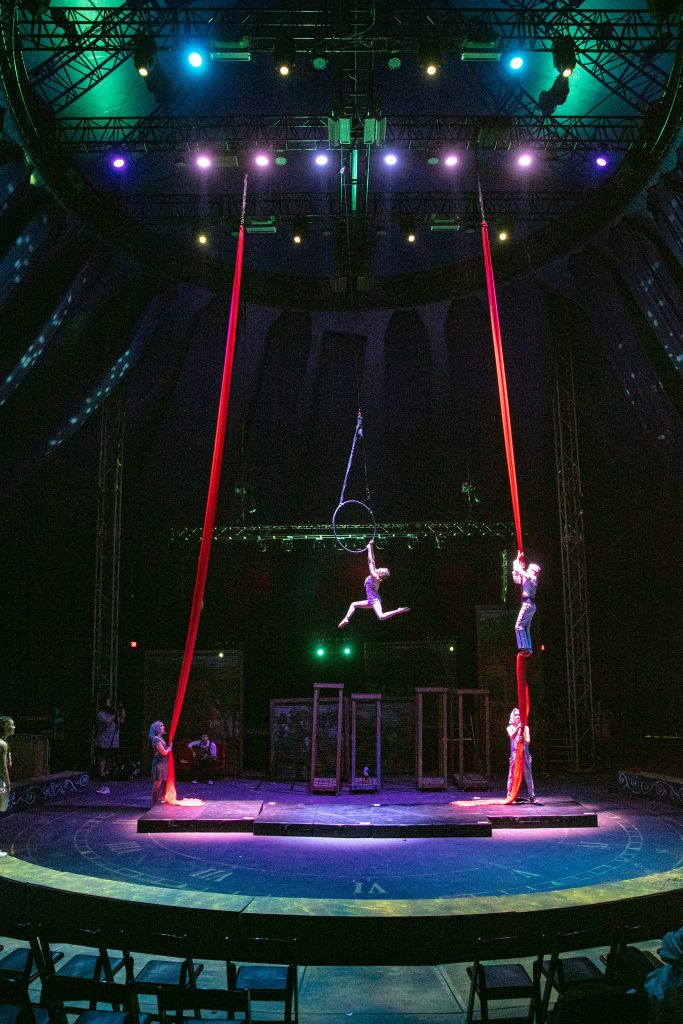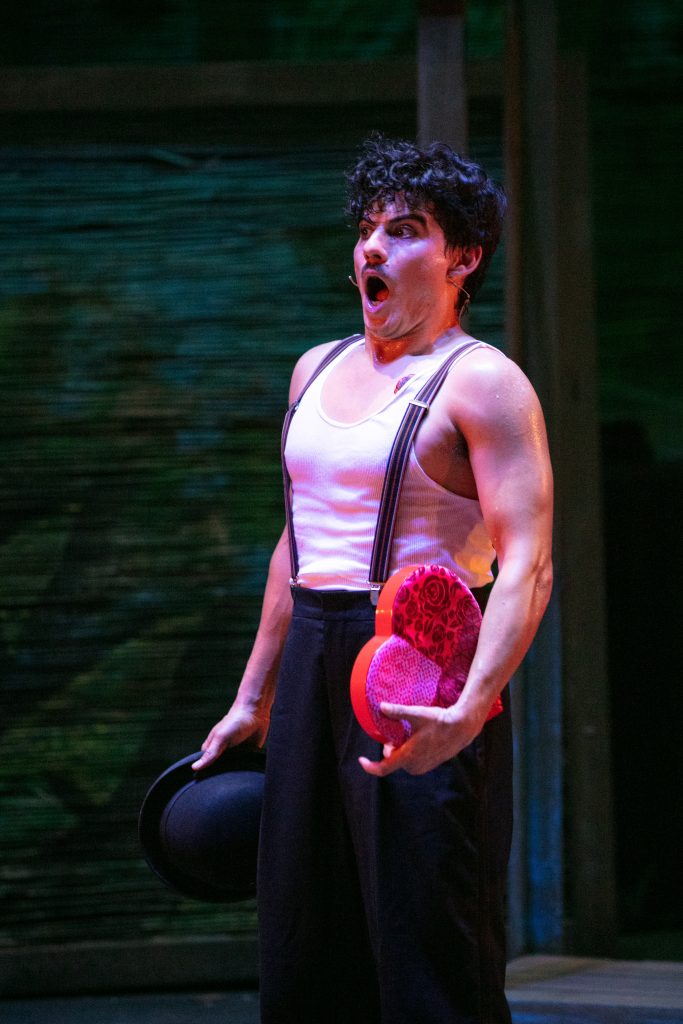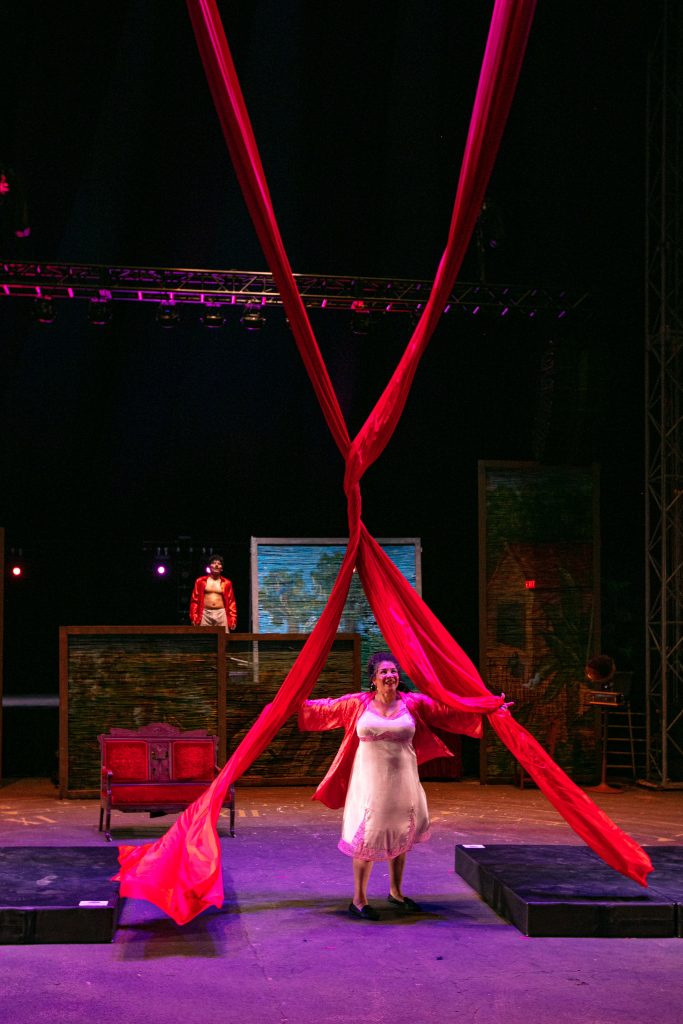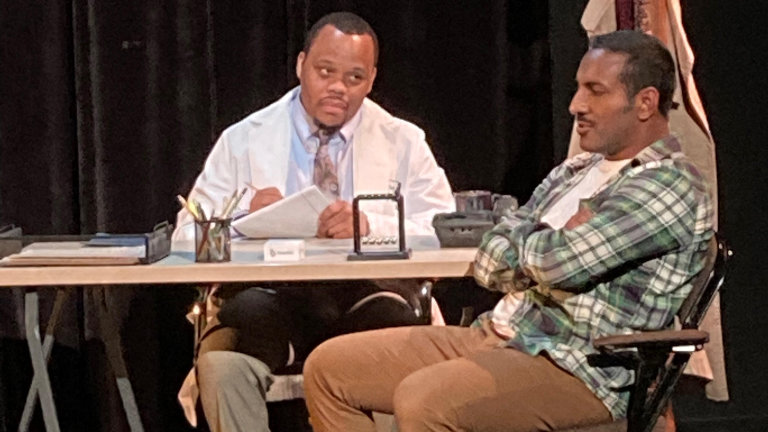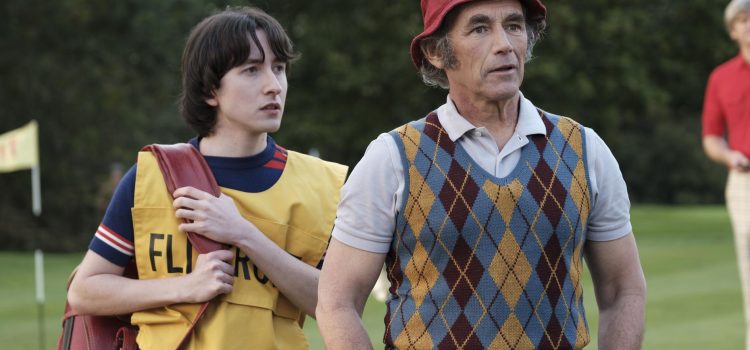By Lynn Venhaus
With shimmering visuals and costumes, “House of Joy” shows flashes of dazzling technical brilliance at the Repertory Theatre of St. Louis. Unfortunately, while mysterious and mystical, the storytelling is where it falters.
In a time and a place far, far away, the fictional setting is a South Asian kingdom – let’s just presume the Islamic Mughal Empire (16th-19th century) in around 1666. Apparently, society is segregated and we’re only seeing the females in the palace – and a eunuch who oversees this court of women.
Because it is disorienting at first, the play takes a long time to establish characters and their motives, then crowds the action in the second act, before it rushes to an unsatisfying open-ended conclusion, and overall is not as cohesive as it purports to be.
It’s as if playwright Madhuri Shekar has decided it’s best if we fill in the blanks ourselves, and the tone is all over the place. Dramaturg Salma S. Zohdi hasn’t connected the dots either.
Perhaps it’s because the loyalties shift between the poorly drawn characters and the story, with its multi-thread subplots that aren’t fully realized, doesn’t give us much to invest in during its two-hour runtime.
Questions, I have questions. Most importantly, why did this play need a rewrite that shifted the focus to a 7-person cast with six females and a same-sex love story? Why is it set in an unnamed empire and an unspecified time? Why does so much action take place off-stage?

While I can’t speak of the original one from earlier productions 2017- 2019, but only the rewrite that premiered in St. Louis, this current plot boils down to palace intrigue and chicanery regarding a power struggle between the emperor and his conniving daughter, Princess Noorah (Aila Ayilam Peck), from an earlier marriage. And unseen rebel forces we don’t know about but are alluded to in conversation.
The unseen despicable old emperor is currently married to a naïve young girl, Mariyam (Emily Marso), who is very pregnant, and living an arranged life she never imagined. Her job is to breed, and after she gives birth to an heir, she’s not as useful.
Lonely and miserable, this innocent queen has fallen in love with the newest palace guard, Roshni (Tina Munoz Pandya) of the all-female imperial harem.
Roshni, with a bloody tragic past that’s rather muddled, was befriended by the sly fox eunuch Salima (Omer Abbas Salem), who recommended her for the job. She had to impress the tough captain of the guards Gulal (Miriam A. Laube), who is demanding and still watches her carefully.
She loves the job, and her best bud working long shifts together in this self-described utopia is Hamida (Sumi Yu).
Salima and Gulal are the ones who know everything going on in the palace and where the loyalties lie. You don’t know if they can be trusted, however – they leave it up to interpretation. But if you are on their good side, then you are protected in the power plays.
What the back-stabbing (or merely stabby) princess wants to pull off – toppling the patriarchy! — seems like a disaster waiting to happen and there are shifting moving parts to the unrest/coup/insurrection, so much so that it’s confusing.
The stereotypical evil princess is merely a caricature in Peck’s hands. Overall, we have two sets of actors – the ones who stay in their lane and then the melodramatic ones who go over the top, as if they are in a daytime soap opera.

Yu is strong as Hamida and tries hard to flesh out her character. Regina Fernandez appears in four minor roles to round out the cast. As the couple at its center, Marso and Pandya are convincing in their passion and desire – and I rooted for them (after all, love is love is love is love).
The dialogue is flecked with modern words and phrases. I’m assuming whatever past century the characters are in, no one said “tittie” or “I’m aware.” This habit of writing period pieces in modern vernacular is often distracting – and annoying.
And as we hear long passages of exposition about what’s gone on in the past and what’s taking place off-site or off-stage, the story remains curiously uninvolving.
There is some bewildering mumbo-jumbo – a dead mother re-appearing as a ghost/apparition and a glowing pile of coals centerstage – that means something we’re supposed to figure out.
The love story overtakes the drama, and its romantic structure is clumsy. Paradise now is a prison for Roshni and Mariyam.
And then, we endure an unnecessary and gratuitous staging of a shockingly graphic sex scene in a boat.
What is the point here? We already know they are in love, and it is forbidden – she’s married! To the Emperor! And while everyone seems to know, it still is a situation fraught with danger. Illicit affairs have gone on in royal families, this is nothing new nor does it appear to be anything other than a garden variety plot conceit.
Despite whatever direction the intimacy coordinator (Gaby Labotka, who is also the fight choreographer) decided on, the scene is uncomfortable, with its simulation of stimulation and orgasm, and really takes the audience out of the story.
All I could think about was the teacher who brought a busload of (what looked like) junior high kids that I saw in the lobby, and the comments and complaints he/she would have to deal with, and if any parents came along as chaperones.
Yes, the play is for mature audiences. The Rep has stated, for content transparency: “This production contains adult sexual content, language, moments of violence, haze/fog and suggestive moments of smoking.”
Apparently, I’m not the only one who felt uneasy. Since opening night, people have contacted me, recounting patrons audibly gasping and others walking out. There appears to be a harsh negative backlash among longtime theatergoers. The play is polarizing, for there are others who enjoyed it very much.
Defenders will call us prudes and unenlightened. Us rubes here in flyover country don’t know theater and we need to be lectured at every opportunity by professionals who think they know more than we do, because how could we know anything about theater? (Now is the time to shake your head or chuckle or spit-take or whisper your feelings – or curse and shout that I’m very wrong).
I don’t need a lecture, and quite frankly, I’m tired of being told what I should like because it might take me out of my comfort zone (which I don’t mind at all, if it’s well-constructed, well-acted and says something).
I’m “aware.” Art is subjective. This is only my opinion. Whether or not you agree, I consider my role is to explain my view – and if something is worth your time and money.
Not that I need to explain myself, but I have seen many controversial plays, many heralded shows that fall short in a certain venue or a regional group’s interpretation. It happens. Isn’t the first rule of theater “know your audience”?
Go ahead, push boundaries, if it helps the story and its impact. Was it necessary to convey a romance in such a way? No. Discretion would have gotten the point across with several kisses and embraces.
For the record, I consider The Rep’s “Take Me Out” in 2005, part of its acclaimed but short-lived “Off the Ramp” series, to be one of the finest productions I have ever seen, and I sat very, very close to full frontal nudity while ball player characters rinsed, lathered, and repeated in shower scenes. (Fun Fact: I won an Illinois Press Association award for that review, back when they awarded reviews, and I was a full-time newspaper employee).
Of course, “House of Joy” is more than one incendiary scene, but by the time chaos and revolt occurs, is anyone on the edge of their seat? And do we really understand what is happening, and who’s aligned with who?
Its ambition is to be epic in scope, and the play is being misrepresented by comparing it to more cinematic genre-busting fare, calling it “Swashbuckling”? This is nothing close to DC’s Wonder Woman or the bad-ass Marvel Cinematic Universe women in “Black Panther.”
Of course, I’m all for women power, for I stand on the shoulders of giants. Sisters doing it for themselves is reason to celebrate. Getting away from abuse is necessary, especially for the queen. Can we get something to cheer about that’s lucid?
Playwright Shekar comes with quite a resume, full of awards and recognition, and has television and film credits as well. It doesn’t matter what she did before or after this play to a puzzled audience watching “House of Joy.”
If this is the first time this version has been presented, perhaps it needs to be workshopped further to make it stronger and more appealing.

Nevertheless, the production elements are stunning in execution – particularly what’s swirling on the on-stage screen, the collaboration between Projections Designer Stefania Bulbarella, Projections Programmer Devin Kinch, Projections Animator/Illustrator Joaquin Dagnino and Associate Projections Designer Brian Pacelli, who take it to next-level by changing it constantly and expanding the panoramic vistas.
That technical razzle-dazzle is complemented by Lighting Designer Sarah Hughey and Sound Designer Porchanok “Nok” Kanchanabanca. The costumes designed by Oona Natesan are exotic and elegant, with outstanding hairstyling (no name in program).
Director Lavina Jadhwani utilizes a spare stage designed by Dahlia Al-Habeli where movement flows crisply, and the palace guards are choreographed by Aparna Kalyanaraman.
Because this is what I consider a work-in-progress, in her program notes, Jadhwani described putting this show together as “jumping onboard a moving train.” Maybe some of us found it to be a trainwreck – it needs to be disassembled and put back together logically.
I didn’t find “House of Joy” joyous or fun or exciting or any of the words being used in marketing. Sure, it’s about “all you need is love” or “love is the answer” or “the love you take is equal to the love you make.” I think.
I’d like to have reasons to determine its impact. Spoiler alert: We don’t really know what happens to most of the characters when it ends, so how can we be moved or know what to feel when it leaves us hanging?
Answers, I’d like answers.
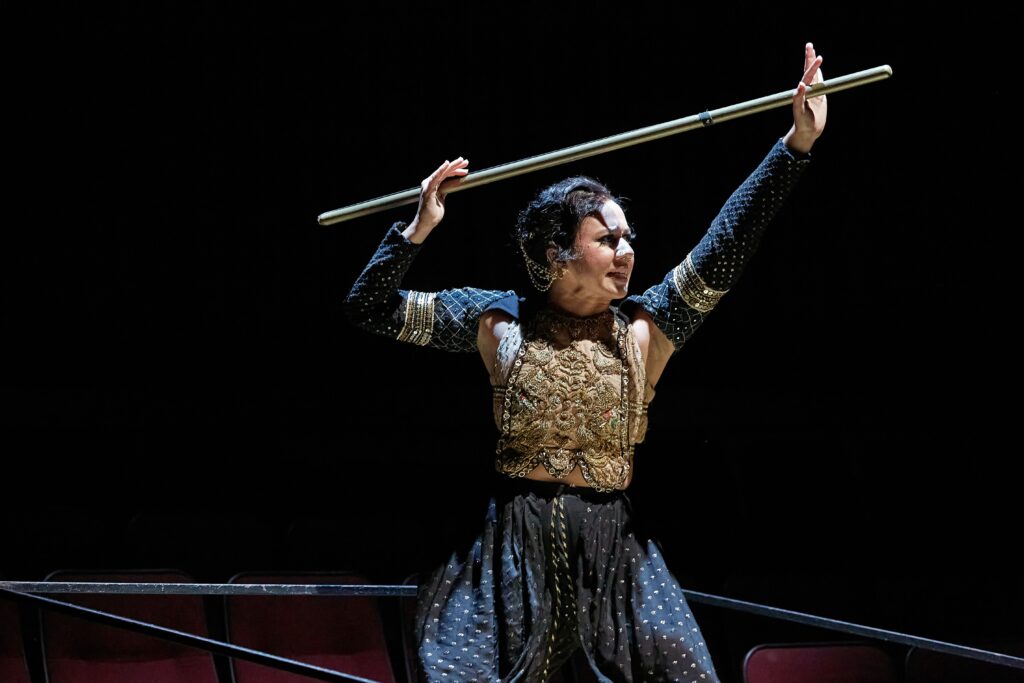
Photos by Eric Woolsey.
“House of Joy” is being presented Aug. 28 – Sept. 18 on The Repertory Theatre of St. Louis’ mainstage, 130 Edgar Road, Webster Groves. For schedule of performances and ticket information, visit www.repstl.org.
Proof of a full COVID-19 vaccination and a valid ID, or a negative COVID test taken 24 hours before the performance, are required for entry into any Repertory Theatre event. Masks are highly encouraged, but optional. Front of House Staff will have one-time use masks on hand for patrons that would like to use them.

Lynn (Zipfel) Venhaus has had a continuous byline in St. Louis metro region publications since 1978. She writes features and news for Belleville News-Democrat and contributes to St. Louis magazine and other publications.
She is a Rotten Tomatoes-approved film critic, currently reviews films for Webster-Kirkwood Times and KTRS Radio, covers entertainment for PopLifeSTL.com and co-hosts podcast PopLifeSTL.com…Presents.
She is a member of Critics Choice Association, where she serves on the women’s and marketing committees; Alliance of Women Film Journalists; and on the board of the St. Louis Film Critics Association. She is a founding and board member of the St. Louis Theater Circle.
She is retired from teaching journalism/media as an adjunct college instructor.




